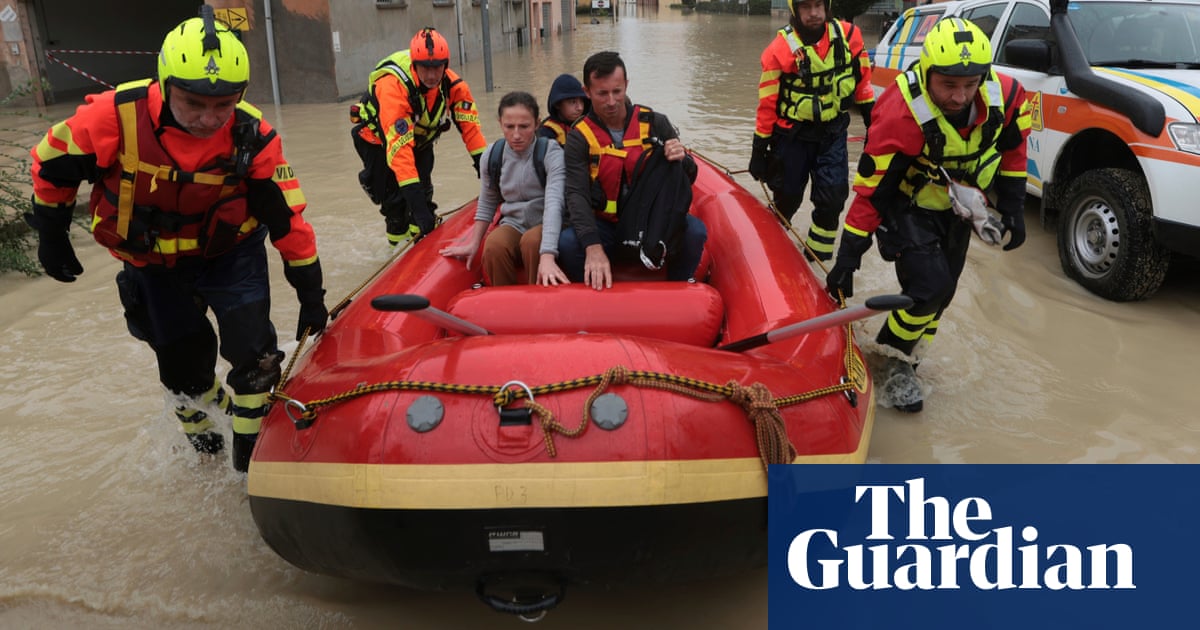Two people are missing and about 1,000 people have been evacuated from their homes in the northern Italian region of Emilia-Romagna after devastating floods and landslides, as Giorgia Meloni’s far-right government was accused of lacking the will to confront the climate crisis.
The flooding was brought on by Storm Boris, which had earlier wreaked havoc in central and eastern Europe, killing at least 24 people. Several major cities in central Europe were bracing for swollen rivers to peak on Thursday.
The torrential rain engulfed the same areas of Emilia-Romagna that were badly affected by flooding in May 2023, which killed 17 people and caused €8.5bn (£7.14bn) of damage.
Two people were reported missing in Traversara, a hamlet in Ravenna province, after the Lamone River burst its banks.
Schools have closed, railway lines been disrupted and some roads blocked by landslides.
Firefighters have carried out more than 500 rescue operations in the region, including using helicopters to lift people from flooded homes.
“We are in a full emergency … the event is very similar to what we had last May,” Michele De Pascale, the mayor of Ravenna, told Radio 24.
There are no deaths reported in the latest flooding, which has also affected parts of the neighbouring Marche region. However, anger is mounting among residents at the sluggish progress of works intended to help protect the region from flooding.
“My home has once again been destroyed,” a resident in Faenza, a town in Ravenna province, said in a video collated by Local Team, an Italian photo and video agency. “It’s shameful; the politicians do nothing.”
Extreme rainfall is becoming more common because of human-caused climate breakdown across most of the world. Warmer air can hold more water vapour, while human factors, such as flood defence planning and land use, are also important factors in flooding.
Italy is among Europe’s climate risk spots. This summer alone it has endured unprecedented heatwaves, drought, wildfires, storms and severe flooding.
Angelo Bonelli, who leads the leftwing Alleanza Verdi e Sinistra party, on Thursday urged Meloni to explain her government’s strategy in addressing the climate crisis.
“There is no will to face the climate crisis,” he said. “The truth is that the climate crisis causes damage, and economic damage. The climate issue must not have a political characterisation. Unfortunately, it is an objective fact that we have to deal with. The premier, Meloni, must tell parliament which initiatives she intends to adopt.”
Meanwhile, Alice Buonguerrieri, a deputy in Meloni’s Brothers of Italy party, said she would file a complaint with prosecutors “to determine responsibility” for the latest flooding. She claimed the region’s centre-left authorities had spent only €49m of the €130m allocated by the government last year to build flood defences.
In eastern and central Europe, the flooding was the worst in two decades. At least 24 people have died – five in the Czech Republic, seven in Romania, seven in Poland and five in Austria. The damage is estimated at billions of euros, with roads, bridges and railway lines destroyed and whole neighbourhoods submerged.
In Poland’s third-largest city, Wrocław, the defences appeared to be holding firm after two frantic days of work to reinforce them by the military and civil protection forces and volunteers among the city’s 600,000 residents. Poland has deployed 14,000 troops to its hardest-hit region, near the Czech border.
“It is too early to say the flood in Wrocław has been overcome,” the Polish prime minister, Donald Tusk, told a crisis meeting. “I would prefer that we hold on nervously and try to guess … the state of rivers as accurately as possible.”
Tusk was later due to meet the European Commission president, Ursula von der Leyen, and the prime ministers of the Czech Republic, Slovakia and Austria to discuss aid for the region, which has been hit by five times the average rainfall for September in five days.
In Hungary, which has reinforced defences along more than 500km of riverbank, the Danube was not due to peak in the capital, Budapest, until Saturday. The prime minister, Viktor Orbàn, said the water should be below record 2013 levels and Hungary would “mount a successful defence against this flood as well”.

